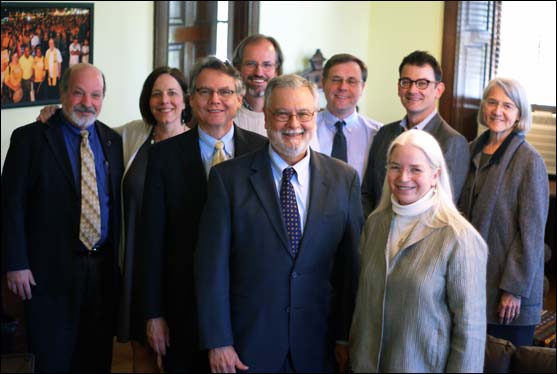
Two UU seminaries to receive $1M each over five years
UUA funding panel seeks to focus on UU-identity schools and education.
A recently signed memorandum of understanding between the panel and the two UU seminaries, Meadville Lombard Theological School in Chicago and Starr King School for the Ministry in Berkeley, Calif., outlines the grant money the panel will give: a total of $1 million to each seminary over the next five years. The $400,000 ($200,000 to each school) annual unrestricted grant represents the bulk of the money the panel gives each year.
That support is important at a time of great change in theological education, according to the Rev. Rob Hardies, senior minister of All Souls Unitarian Church in Washington, D.C., and chair of the panel. “It’s a time of great creativity and change in graduate theological education. Some schools are closing, unable to make it. Others are creatively adapting for the 21st century. Both of our UU-identity schools are engaged in creative innovation in order to continue to be thriving seminaries in the 21st century. Distance learning, modified residency, and robust online education opportunities: these are the ways they’re continuing to position themselves to serve Unitarian Universalism.”
In 2011, the panel adopted a mission that worked with the goals or “ends” of the UUA Board of Trustees. The mission states: “To cultivate and sustain knowledgeable stewards and creative transformers of the Unitarian Universalist tradition.” As part of that, the panel has two priorities: to support UU-identity education, and also to facilitate conversation about the future of UU theological education. The memorandum of understanding is a tangible sign of the first priority, and a conference in April 2014 in Chicago will further the second.
“Rather than simply a funding panel – how do you spend money? – we are moving to be a convener of conversation about the future of UU theological education, and to be an advocate for that future,” Hardies said. “It’s a more robust and vigorous role for the panel than in the past.”
The panel meets twice a year, usually in October and April, to decide how best to support theological education for Unitarian Universalists, dispensing between $500,000 and $600,000 a year, the interest from an $11 million endowment originally given by the UU Congregation at Shelter Rock in 1983. The panel is a committee of the UUA president, and includes ministers, scholars, religious educators, and UUA staff and officers.
The next largest group of grants, about $50,000-$60,000, goes to direct scholarships for UU scholars “who are committed to strengthening the UU movement through research and publication, excellence in teaching, and educational leadership,” according to the panel. Most of those scholarships are given to people seeking to finish dissertations for their doctoral degrees.
The remainder of grant money is given to support “Renaissance Modules,” which are continuing education and certification programs for religious educators, and “creative initiatives” that more broadly meet the definition of UU theological education. A meeting of UU military chaplains, the first of its kind, was initially funded by one of the panel’s grants. Conferences of UU scholars, which rotate between Starr King, Meadville Lombard, and Harvard Divinity School, are also funded through the panel’s grants.
“We’ve helped fund things like Fulfilling the Call [a continuing education program for UU ministers] and we help seed things,” said the Rev. Sarah Lammert, the UUA’s director of ministries and faith development, and a member of the panel. “This year we’re helping fund a retreat for ‘after pastors’, who work to help churches in the wake of ministerial misconduct. We want to support theological education in a broad sense, which means sometimes continuing education and seminary and doctoral work.”
UU schools are ‘priority’
Recent years have seen some changes and evolution in the panel’s work. In 2007, under direction from the UUA Board of Trustees, the panel had considered whether giving the bulk of its grants to the two UU seminaries was the best way to meet its vision, especially given that the majority of UU ministers do not attend either of the UU schools (though many students at non-UU schools do take some classes through either Meadville Lombard or Starr King). The Rev. Barbara Merritt, then the chair of the panel, said the panel worked to ensure transparency and communication, including hosting a meeting with various stakeholders such as the UU Ministers Association, the two UU seminaries, the Ministerial Fellowship Committee, and others.
“We wanted to bring real transparency and accountability to the panel’s work,” Merritt said.
Since then, the panel has committed to supporting Meadville Lombard and Starr King as one of its priorities, and the new memorandum reflects that, Hardies said.
“The panel has focused its priority on UU-identity schools and education,” Hardies said. “Lots of schools can teach people how to be ministers, but only certain schools can teach what it means to be Unitarian Universalist, both what it has meant and what it can mean in the future. If we don’t support our schools, we’re going to have a real problem.”
Photograph (above): Members of the Panel on Theological Education met at the UUA headquarters in Boston in April to sign a memorandum of understanding between the UUA and Starr King School for Ministry and Meadville Lombard Theological School. From left: the Rev. Rob Eller-Isaacs; the Rev. Sarah Lammert; the Rev. Dr. Lee Barker, president of Meadville Lombard Theological School; Harvard Divinity School senior lecturer Dan McKanan; UUA President Peter Morales; the Rev. David Pettee; the Rev. Dr. Rebecca Parker, president of Starr King School for the Ministry; the Rev. Dr. Rob Hardies; and the Rev. Ginger Luke (© Christopher L. Walton). See sidebar for links to related resources.
Comments powered by Disqus






